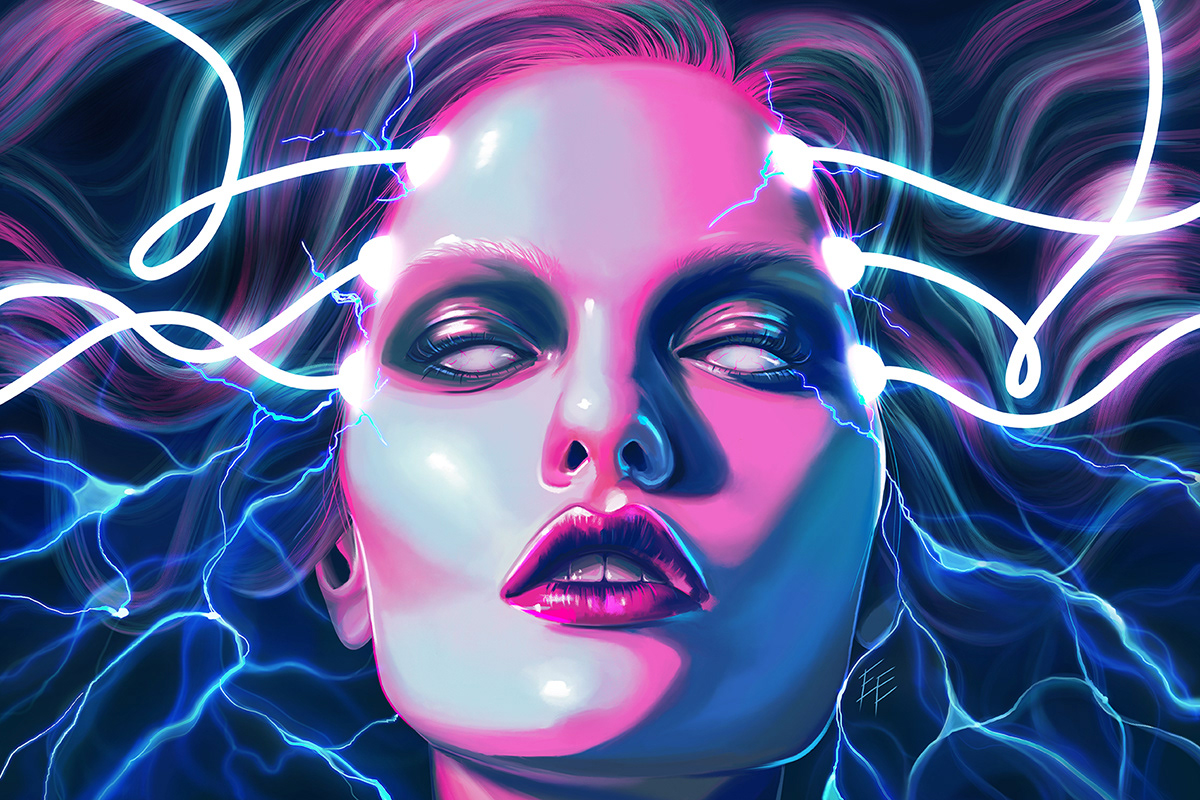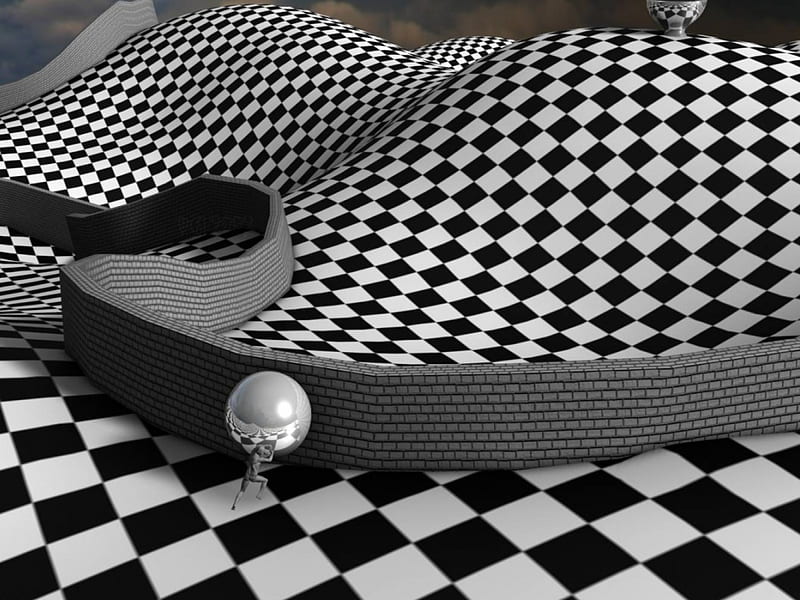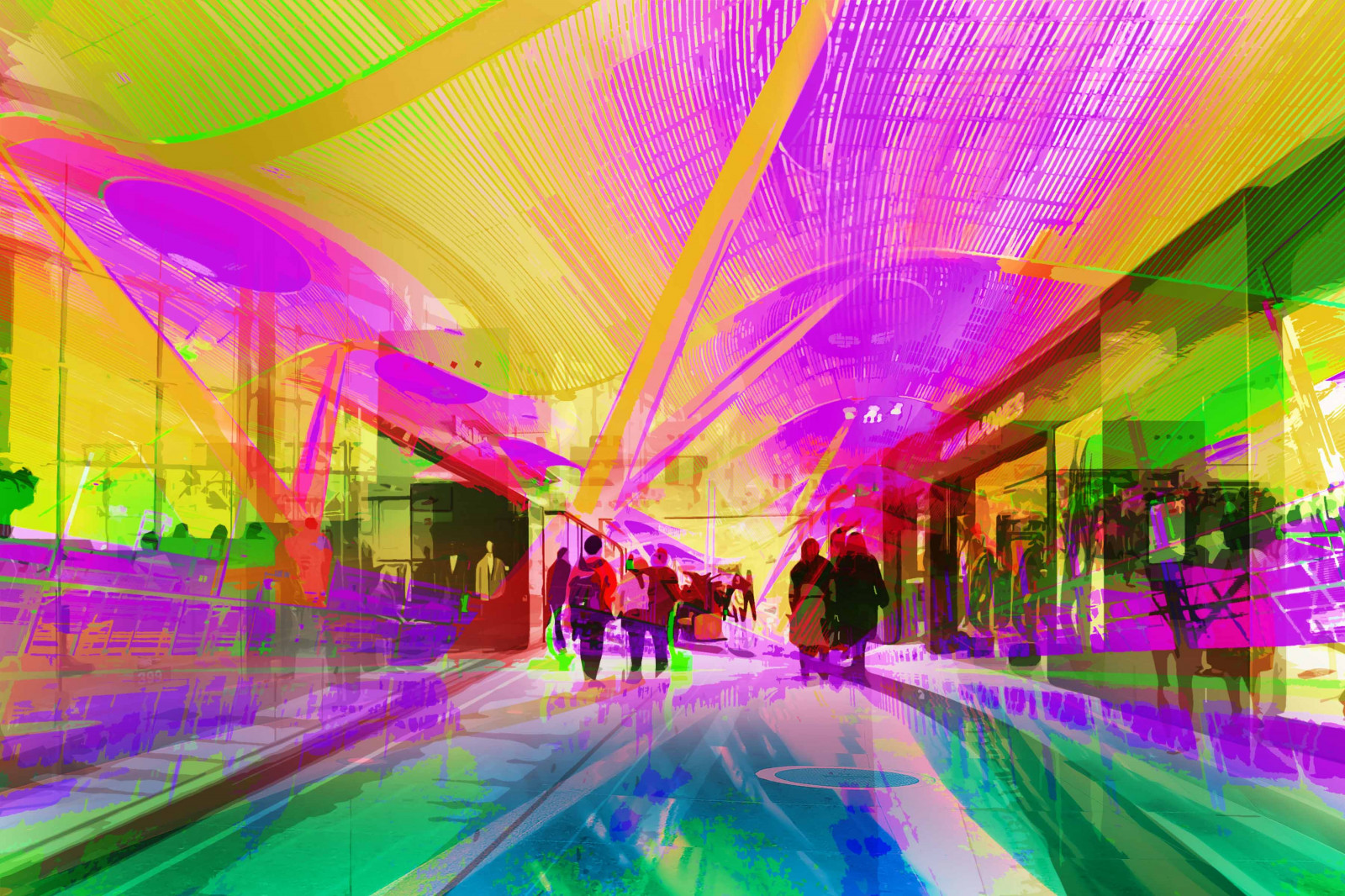In the normal everyday state of mind that we find ourselves in most of the time, there is no awareness that there are things which are concealed from us; we have no sense of ‘things invisible’ – on the contrary, we are convinced that everything is laid out in front of us, plainly and straightforwardly. We think that we know everything that there is to know – everything that is important for us to know, anyway. What we don’t know – we think – can’t be very significant…
This belief or assumption is a sort of a ‘comfort zone’ for us, it is like the naïve view of a young child that all grown-ups are friendly and helpful and wise, when of course the truth is very far from this. Although we seem to have adequate perspective on matters as we go through the business of our everyday lives, actually we have practically no perspective at all. This seems like a rather outrageous suggestion, but with a bit of patience and forbearance, we can arrive at a position from which our automatic sense of ‘certainty’ in ourselves and our view of things no longer seems so unchallengeable.
The idea that we are putting forward here is that our normal state of consciousness is lacking in a particular dimension, the dimension which Wei Wu Wei calls the ‘vertical dimension’ (or the vertical view). This lack of vertical vision means that we can only see things in a flat plane, and this in turn means that we are trapped in the maze of the rational mind, being unable to see over the walls which are the ‘beliefs’, and ‘assumptions’ that surround us on all sides, and channel us without freedom in directions that have already been laid out for us.
This is like what happens when the tide goes out on a rocky coastline, leaving bits of the sea stranded in rock pools here and there. When the tide goes out, the sea gets trapped in the various indentations of the rocks as ‘finite pools’, and no longer realizes its true identity as the infinite ocean. The ‘ocean’ is a metaphor for unconditioned consciousness (which is to say, consciousness that is not held in or contained by limiting beliefs and ideas about reality), whereas the isolated rock pool stands for the rational mind which consciousness is trapped in, unaware of its true nature.
When the tide of full consciousness retreats, we lose the vertical dimension – we lose all height, all perspective, all ability to see the truth. Instead, we are aware only of constrained or limited truth, which is to say, the truth as it is represented by our rational minds. The rational mind is exactly like a maze, only rather than being the sort of maze that has an exit hidden in it somewhere, it is a maze with no exit – it is a ‘blind maze’, so to speak. This is another way of saying that it is full of dead-ends and blind alleys that at first appear to go somewhere, but which in reality go nowhere at all.
Because our minds have this maze-like character, so too do our lives. Because my rational mind is in essence no more than a finite collection of passages or channels that in fact go nowhere, my life is going to reflect this fact – basically, my life turns into the cyclically repeated attempt to escape through all the various deceptive ‘exits’ that my mind provides me with. Because my understanding is finite (or ‘closed’), so too is my life. If my mind is like a maze, then naturally I spend all my time trapped in this maze, instead of being free to experience the world outside, which by definition is not ‘closed’.
Inasmuch as ‘who we are’ (or ‘who we take ourselves to be’) is all tied up with our rational or finite minds we can also say that the personality which we take on is also a complicated arrangement of blind allies and circular journeys that we get trapped in. This may not be a very nice way to describe the personality, but the fact that it isn’t nice does not mean that it isn’t true. The ‘blindness’ inherent in the mind-maze of the personality includes the chronic inability to see the unpleasant truth of our situation, which is that there is no escape from the maze (at least not within the terms that it offers us, which are the only terms that we are aware of).
From this blindness, a sinister ‘reversal’ takes place whereby our consciousness becomes conditioned by the limited or cyclic pattern of the maze, and ends up, as a result of this conditioning, identifying itself with this set of limits, this cyclic pattern. The consequence of this is that we no longer really want to escape from the maze because we think that the maze is who we are. The process of ‘passive identification’ that takes place means that consciousness mistakenly takes itself to be the same thing as that ‘collection of blind alleys that think they are actually going somewhere’ (i.e. the rational mind).
This is what puts the final lid on our chances of becoming genuinely free because even when we do get sickened and disheartened by ‘life in the maze’ our attempts to escape are never any more than theatrical efforts designed to temporarily distract ourselves from our misery. Deep down, we are not sincere because we are actually attached to the limiting pattern of our lives. We are the pattern, or – rather – the pattern is us, and it lives out its own meaningless and false life through us, with our willing compliance. Of course we hate it at times, but this is a ‘love-hate’ relationship because although we might hate it, we depend on it at the same time, and dare not for a second seriously consider the possibility of doing without it. We only pretend to ourselves that we want to do without it, like an alcoholic pretending that he wants to give up the drink.
If anything ever did happen to threaten the integrity of the finite or cyclic mind (the hypnotically repeating pattern to which we are addicted), then we would automatically and forcefully react to protect and perpetuate that pattern. Ironically, we cherish the trap that imprisons us and nurture it carefully day by day. By serving and obeying the trapping pattern as if it were my own true self, I make its power over me complete – this is ‘total enslavement of consciousness by a false master’. And all the time the pain of the imprisonment grows, until it becomes so bitter, and so all-consuming, as to be practically unbearable.
What we call ‘depression’ can be explained purely in terms of this situation. In other words, its not that we have got some illness like measles or mumps (which is what people would have us believe) but rather we are starting to experience the pain that comes with being trapped in our own rational minds. I am ‘depressed’ because I am starting to be aware of the truth of my situation – I am starting to see just how futile and meaningless and false it all is. I don’t want to carry on with my life because the thought of spending it enacting this same wretched pattern over and over again fills me with horror. This is really a philosophical point – “What is all this for? What is the point?” are questions that tend to come to my mind.
We are not encouraged to think too much about this sort of question. Rather, we are encouraged to join in the ceaseless frenetic activity of artificial social life, which basically comes down to ‘making ourselves too busy to be able to see that we are actually leading meaningless lives’. If I am busy enough, committed to my rational goals enough, then I will not notice how empty my business is, and how hollow my goals are. Thus – caught up as we are in the fast track of life in the twenty-first century – we find ourselves progressing rapidly to the condition of being hollow people who are too distracted to know that they are hollow. If someone does start to get demotivated and disillusioned, then we say that they have an illness called ‘depression’ and we give them medication – so that they can go back to sleep, so they can go right back to not knowing their lives are hollow and devoid of any true freedom. Ignorance is bliss, as far as we are concerned. We think we’re awake, but we’re asleep. We’re constantly hitting the snooze button, we’re nodding off the whole time!
‘Anxiety’ can also be understood in terms of our predicament of being imprisoned without knowing that we are imprisoned. In this case what I am starting to become disillusioned about is my ability to escape from difficult or unwanted situations. The type of false escaping that most people seem to have (the self-deceiving belief that we can find freedom within a fundamentally unfree situation) is no longer a possibility for us. I start to become aware – in an indirect way – that I have no real or effective ‘ability to escape’. I start to realize that ‘there is no escape’, in other words – even though I struggle and fight against this realization as hard as I can. Anxiety not only involves the unsuccessful attempt to repress the awareness that ‘there is no way out’, it also involves the unsuccessful attempt to repress the awareness that there is no way out from seeing that there is no way out.
Therefore, in anxiety, truth starts to reveal itself as an indefatigable force – a force that cannot be denied. The dawning of unfettered awareness means that I can’t help seeing that I can’t escape, and I also can’t help seeing that I can’t escape from seeing that I can’t escape – which is of course what I would prefer, since life in the mind maze is only tolerable if we resort to self-deception. I want to escape from seeing how futile everything is, I want to escape from seeing how lacking in freedom I am.
When the ability to self-deceive starts to become unreliable, when it starts to refuse to work for me (like the engine in a car that has been left out in bad weather too long) then I start to feel the pinch of the prison that I am in. I have been ‘let down’ by a mechanism that everyone else takes for granted, and this is not a nice feeling. Nobody else even knows that the mechanism, the dependence on self-deception is even there, and so they think that there is something wrong with me. Actually, however, I am closer to the truth than they are – even though I may not be very happy about this.
When I am depressed then that means that I am starting to see that the false self has no real ability to be; I see that is has no genuine being – I see that that it is false, superficial and hollow. When I am anxious I see that the false self has no real ability to do; I see that I have misplaced confidence in my ability to act and choose effectively and freely, since without being, I cannot do. Without being, all that happens is that I am helplessly acted upon (or ‘puppeted’) by external forces, which cause me to ‘re-act’ rather than act. Of course, my comfort zone is usually to identify with these external forces (with the external pattern that expresses itself through these forces), and this way I get to feel that it is my own free will. I identify with the external ‘rules’, the rules that control me, and as a result I feel personally vindicated when they are successfully acted out. This is the ‘false freedom’ of the passively identified self, the self that is too afraid to see its true situation.
A good way of understanding the predicament of consciousness that has become identified with the ‘blind maze’ of personality and the mind is to reflect on what happiness really means. For the identified or conditioned self, happiness means ‘happiness on my own terms’ or ‘happiness in relation to me’. In other words, when I am identified with the trap that is the mind maze, I want this trap (which is who I think I am) to experience the happiness. I want happiness, to be sure, but I want it for the false self. The false self wants the happiness. But of course there can be no true happiness for the false self any more than there can be true freedom in a blind maze that does not know itself to be blind.
All that the false self can ever experience is false happiness, or ‘pleasure’, which is the satisfaction that it gets when things ‘go its way’. However, for every delightful drop of pleasure that it gets it must pay later on in the form of excruciating pain, since pleasure and pain are the two sides of the same coin. All satisfactions ultimately give way to the corresponding dissatisfaction since the outcomes (or possibilities) that I am attached to are not real, but are the merely the static projections of the rational mind, projected onto a fluid, ever-changing and unknowable world.
Happiness is the exact same thing as ‘genuine freedom’, and so when we hunt for happiness we are wanting happiness, but wanting to remain unfree at the same time – since we cannot ever consider giving up our prison, our limiting pattern. Once we put it like this then the irony is obvious – the conditioned self can never be happy, happiness is there alright but it is not a garment that can be worn by the false self.
Freedom is not won for the false self because the false self is itself the antithesis of freedom. How can a prison ever be free? How can a finite, repeating pattern ever be endlessly new and fresh? We should not talk in terms of freedom for the false self, but in terms of freedom from the false self. Happiness is therefore not something that exists ‘for me’, but rather it is the result of being free ‘from me’.
As soon as I pass beyond the deadly poisonous and oppressively suffocating gravitational field of the ‘me that I supposed myself to be’ then I discover where freedom and happiness are – they are everywhere that the false self is not. Since the false self never really existed in the first place (since it was never any more than a fiction that we got trapped in and started to believe in due to lack of perspective) this means that freedom and happiness are in fact aspects of an indestructible reality. This in turns means that we don’t have to fight to obtain or create these qualities – in fact if I find myself fighting or struggling for happiness or peace of mind then this means that I am backing the wrong horse right from the start.
As a rule of thumb, if I am struggling desperately against something, or fighting desperately to secure something, then what I am battling against is the truth. Needless to say, peace of mind is hardly going to come about as a result of fighting against the truth! Peace of mind only comes one way, and that is – obviously enough – as a result of ‘allowing the truth to win’.
And furthermore – in case there is any misunderstanding about this – it is important to stress that ‘allowing the truth to win’ is not a deliberate choice that I make. It is not my decision – I do not control the situation so that the truth comes out, but rather I cease controlling so that the truth may come out by itself. The truth has nothing to do with me – I cannot deliberately facilitate it, or encourage it, or woo it in any way, but I can see it.
As soon as we switch over sides (so to speak), then our situation is vastly, incalculably improved. Beforehand we were in the terrible situation of being wholly dependent upon a strategy that could not win; we were putting all our money on a horse that was never even going to finish the race. It was a horse with no legs.
But when I stop being stubbornly orientated in the direction of self-deception then everything changes for the better. When my allegiance is no longer to the grim cause of self-deception then the very same indefatigable forces that were ranged against me before, are now working for me. The very pain that I am experiencing is working for me, my failure and defeat is working for me, and so how can I go wrong? When the truth is on our side, rather than being the enemy, then there are no real problems…







Jeffrey H Shampnois
As always, very clear and insightful.